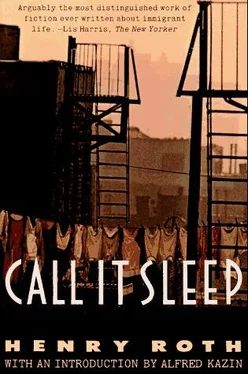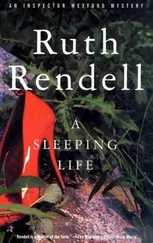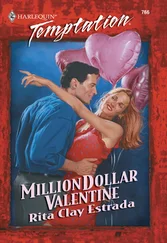“Aw’ yaw dumb too,” said Izzy cuttingly.
“So he sh’d worry,” the rest consoled themselves. “De rebbeh never hits w’en sommbody’s lookin!”
“Yea—? He stuck me in de ass wid de poinder — under de table! So de udder old geezer shouldn’t see!”
“Ppprr!” Lefty surrendered the inch-long reed to Izzy. “Hea! Id’s gedden hod!”
“Give us de fly now if yuh want id.”
“Wad kind d’yuh want? De shiny or de hawsfly?”
“De haws! Dey fighd bedder.”
Tilting the vial up, Srooly spilled two or three flies into his palm, stuffed back into the neck all but one and this he gave to Izzy. In return, the stumpy reed was handed over. The horse-fly, wing-stripped, crawled impotently about on Izzy’s hand.
“Now I’ll show yuh hoddeh smook!” Srooly put the bit of reed to his mouth. “Watch a real, reggilieh smooker — like I loined f’om my fodder! Watch!” and sucked with such abandon the ember at the other end sparkled—“M’lya!” Sudden pain contorted his face. “Luddle luddle! Ow! Id boins like fiah! Ow!” He threw the stub down. “Mplyaw!”
“Yeee! Look o’ him dance!” Glee filled them. They howled with mirth.
“Oooo! My dung! Ow!” Frantically he licked the sides of the glass bottle—“Ooo, id’s hod!”
“Lummox!” they jeered.
“Dot’s watchuh ged fuh bein’ a hog!”
“Wadyl pulyly stho hodth!”
“Aa, shod up!” Srooly was almost in tears. “I’ll feel you off, see if I don’. All o’ yuh! Waid’ll I ged my big brudder aftuh yuh — lousy bestitts!” He walked off, tongue in the wind.
“Big smooker!” They howled after him. “Fot brains! Yaaa! Good fer yuh! Yaaa!”
When their hoots, cat-calls, capers had subsided—“Who yuh gonna give id?” Lefty asked.
“T’ Choloimis on de foist step.” Izzy waved farewell to the fly in his palm. “Bye! Bye! Buzzicoo!”
“Naa, don’ give id t’ him — he’s fat a’reddy. Give id t’ Baby Moider by de fence!”
“Naa!” Zucky urged, “Schreck-dreck by de daw — he’s de best spider in de woild.”
“No, I ain’!” Izzy would not be overruled. “Choloimis ’z’ de biggest so Choloimis geds id.”
He rose. They followed him noisily across the yard.
— No! No! No! (Without stirring, he stared fixedly after them) No! No! You forgot! You forgot!
“Don’t scare ’im! Don’ shake his house! Sh! Stholop yuh plyushin!” They trooped down the cellar steps. From below the level of the yard, as from underground, their stealthy voices rose. “C’n yuh see ’im? Yea! See ’im in his hole dere? See? He’ thyl waitlyn!”
— Ow! (Like a stopper blown or a plug, the terrific jar of awakened terror) The cellar! The cellar! The cellar! Told her now! She, Polly! Aunt Bertha, she told! Knows! Long ago! Long ago! She knows! What? What’s she going to do? What? No! No! Don’t tell, Aunt Bertha! Don’t tell! Don’t! No! No! No! Ow, Mama! Mama!
Shrill from the cellar, their voices rose:
“Dere! Look! Look! T’row it now! Easy don’ bust id! Look o’ him! He’s walkin’ roun’. Whee! Dere he comes! Dere he comes! Lyow! He glyabth ’im! Fight! Fight! Gib’m, haws-fly! In de kishkis — nudder one! C’mon, Choloimis! Yowee! Tie ’im op! He’s god ’im! Wid de legs! Waddye big wungl! Pullin’ him! Pullin’ him! Hully Muzziz! Look! In de hole! Bye! Bye! Buzzicoo! Yea! Yea!” Excited voices fused into a treble dirge. “Bye! Bye! Buzzicoo! Yea Spider! Yea!”
The cheder door swung open. With a hunted expression on their faces, Schloimee and Moish came hurrying out, and a moment later, the rabbi, red lips visible in the glossy black beard, corners down-curved into a threatening frown.
“Where are they?” He crimped blunt brows at David. “There? Below? In that black chaos?”
Grafted to terror, the mind, wrested away, tore terror with it. He couldn’t speak.
“What ails you? Are you gagging? Speak!”
“Th-they’re down there!” He stammered.
“So!” He intoned viciously. “When I’m through with them, even death will spurn them!” And lifting his head, he bellowed across the yard. “Clods! Bleak and eternal! Come out of that pit, you hear me? Come out before a rain of stripes drowns you there!”
Hasty, startled cries below, scufflings, scuffings. They pellmelled up the cellar-steps, halted in a cluster, shamefaced and cowed. He surveyed them. “Mice!” His voice was withering. “Mice! Who gnaws at the Torah next?”
“Me.” Zuck shuffled forward warily.
“You?” Disgustedly. “What is this? Have all the plaster golems in the cheder connived to read in relays? Hanh? Will you torture me like the heathen god? Or what?” His sour gaze swept them, alighted on David. “You! Come in!”
“Me?” He started.
“On whom does my gaze end? Get up!” And once more to the others. “Let the rest of you sit here in an agony! But sit!” He shook a violent finger, and then crooked it at David.
He had scrambled to his feet and hurried to the rabbi’s side. For the first time since he had entered the cheder, the perilous task of reading when the rabbi was angry suddenly became welcome to him. Any anxiety, any disquiet was inviting if it could stem or shunt the fierce rush of this terror.
“Only one more!” As he entered, the rabbi addressed someone inside. “Be patient, Reb Schulim! Would you leave me in disgrace, nor hear at least one limber tongue? Hanh? Surely, you wouldn’t.”
Trailing behind, David peered past him toward the light. In the swirling sepia that always seemed to fill the cheder after the glare of the yard, he could distinguish no one. But when he waded to the window, risen like a square, variegated rock above the sifting dusk, the wavering outlines of a man drifted out of the dim corner beside the rabbi’s chair. The figure was seated, hunched over a cane. The wan gleam on his grey beard was like a whisper from light to shadow.
The rabbi chuckled, apologetically, drew up his chair: “When I can pierce stiff brass with a hair of my head, then I’ll pierce their skulls with wisdom. American Esaus, all of them! But this, Reb Schulim, this is a true Yiddish child.”
Reb Schulim’s only reply was to clear his throat.
David slid over the bench, and while the rabbi pinched the pages, the dusk lifted, and he peeped shyly up at the stranger. He was old, Reb Schulim, hawk-beaked. Although his lipless mouth in the grey beard looked stretched and grim, his eyes, his dark eyes in their intricate pouches were liquid, strangely sorrowful and attentive. Unlike the rabbi, he was neat, wore a black coat of thin, rusty cloth, and instead of an oily brown straw, a wide black hat crumpled the skull cap at the back of his pink and silver-grizzled pate. He hawked incessantly which made David glance up again and again only to be caught in the mournful quietude of those eyes. They affected him strangely.
“He’s a curious child.” Reb Schulim’s voice was husky and deliberate. “His look is hungry and unquiet.”
“You’ve struck it, Reb Schulim!” The rabbi spread hairy fingers on the page — kept them spread. “Sometimes he prays like lightning, sometimes an imp flies into his head and he can’t see a word. Today I know he’ll pray. Here’s something to make him.” As though it were hinged to the book, he lifted his hand, but only enough for Reb Schulim to read — not David. “Do you remember I told you once—?”
Reb Schulim puckered his lips, cleared his throat, lifted grave, benign eyes to David’s face, but made no answer.
“I’d start him in chumish,” the rabbi wheeled the book around. “But I see his mother so rarely. I’ve never asked her — Listen!” He took his hand away from the page. “Begin, my David!”
Читать дальше












